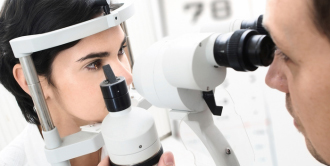Contacts are a fantastic visual aid however it should
always be remembered that a thin piece of plastic is being placed on the surface
of the eye and this needs to be monitored yearly to ensure that your eyes are
coping well, the lenses are not causing any issues and are providing you with the
best possible vision.
A lens review can be conducted as part of a full comprehensive
eye test, this is covered by Medicare, once every 3 years if you are under 65, or
every year for over 65’s. When making
this appointment it’s important to mention that you would like a lens review
as part of the full eye test to ensure that your Eye Care Practitioner is happy
to do this at the same time.
These reviews can be conducted as a short, stand alone
consultation, they may attract fees, depending on the Optical Practice.
So what is the difference between a full comprehensive eye test
and a lens review? The full eye test is an in-depth vision and eye health
examination whereas a lens review only considers the fit of your
contact lenses, your visual acuity, the condition of the front surface of the eye
and an evaluation of the tear film.
When having a lens review, your Eye Care Practitioner
will prefer you to be wearing your lenses to the appointment, so they have
settled in the eye and you are experiencing the quality of vision they provide. This
makes it easy for the fit of the lens, its movement, centration and visual acuity
to be accessed first, easily and quickly.
If you are attending the appointment and have been experiencing
any discomfort with your lenses, do not insert them, but take them with
you.
In order for your Eye Care Practitioner to review the front
surface of the eye you will need to remove your contacts, so it’s a good
idea to bring along a lens case so you can store them and re-insert following
the consultation. A slit lamp will be used to examine the
surface of the eye, (the cornea), it should be smooth and free of any abrasions.
Corneal abrasions can be caused by ill fitting lenses or problems with insertion
and removal techniques, which can be easily addressed if caught early, before
they become a bigger problem.
The stability of the tear film plays an important role in
eye health, suppling nutrients, lubricating natural oils and defending the ocular
surface by flushing away irritants such as pollutants and allergens. Instability of the tear film causes discomfort
due to eye dryness and can affect vision quality. To evaluate the tear film dye
will be used, blinking will disperse the dye over the eyes surface, your Eye Care
Professional will be watching to see how well the tear film disperses, the
coverage and how long it takes for the tear to break up, if this happens
quickly it can indicate eye dryness.
During this review any issues that come up your Eye Care
Professional will be able to offer advice to help you manage your continued
contact lens wear. This sometimes can involve changing the type of lenses that you are using to take advantage of improved technologies and lens
materials, alter lens dimensions or the wearing modality.
As the wearer this is your opportunity to ask a
Professional about any questions you have, consider if the lenses you are using
are comfortable for a full day of wear. Are
you achieving a full 30 days of wear if you have monthly lenses? Are there any activities in your life where
you find the vision with your contact lenses is letting you down? Do you need to
change the wearability of lenses to suit a change in your lifestyle? Are you frustrated that the lenses you have been prescribed are often out of stock,
is there another lens option you could use as a back up when this happens ?
A regular 12 month contact lens review is important as you
are protecting the health of your eyes, ensuring your comfort and vision using
contact lenses is the best it can be so you can continue to enjoy your contacts now and into the future.

